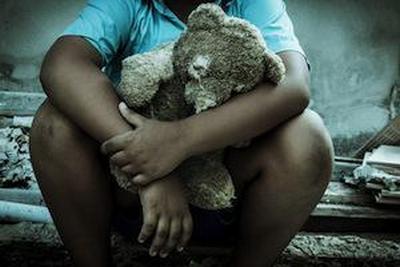Free Initial Consultations
 630-580-6373
630-580-6373With offices in Naperville, Joliet, Wheaton, Plainfield & Chicago
 Studies show that children who witness a domestic violence attack grow up feeling isolated and vulnerable. Witnessing an incident can mean more than just seeing an attack happen. It can also mean a child hearing threats or fighting noises of an abusive situation, or observing the aftermath such as blood, bruises, crying, torn clothing, and broken items around the house. All of these can have long term effects on the child of an abusive relationship.
Studies show that children who witness a domestic violence attack grow up feeling isolated and vulnerable. Witnessing an incident can mean more than just seeing an attack happen. It can also mean a child hearing threats or fighting noises of an abusive situation, or observing the aftermath such as blood, bruises, crying, torn clothing, and broken items around the house. All of these can have long term effects on the child of an abusive relationship.
Exposed children can become more fearful or anxious when put into certain situations. This can result in keeping a secret from the rest of their family, whom could have helped the victim otherwise. In some cases, the burden of keeping this undisclosed information can cause adolescents to blame themselves for the abuse they witnessed and think that if they would have told someone or done something about it, then the abuse would not have continued. In extreme cases, children can become emotionally, physically, or even psychologically abandoned.
 If you in the process of a divorce or even just considering divorce, it is important that you have a basic understanding of divorce mediation because it may be a viable, or even your best, option.
If you in the process of a divorce or even just considering divorce, it is important that you have a basic understanding of divorce mediation because it may be a viable, or even your best, option.
What is Divorce Mediation?
Divorce mediation is a process where a trained third-party neutral mediator helps you and the spouse you are divorcing come to decisions about division of property, spousal support, child custody issues, and any other things that you need to figure out for your divorce. Divorce mediation allows a couple to prioritize what is most important to them and to hopefully come up with solutions to problems that both can live with. The mediator is there to help couples come to an agreement and to also make sure that the negotiations are fair and both sides have their voices heard. The mediator is impartial, though he or she can advise couples on the law in Illinois if he or she is an attorney. Mediators also keep the couple focused on the task at hand instead of letting them get bogged down in resentments and emotions.
 Historically, in order to get a divorce, one of the parties would have to prove that there were “grounds” for the divorce. Accepted grounds included adultery, abandonment, and cruelty. In the 1970s states began to pass so called “no fault” divorce laws. No fault divorce laws allow couples to get divorced without one of them being blamed for bad behavior. At the beginning of this year, Illinois made changes to its divorce law to make it even easier for couples to take advantage of the no fault statute.
Historically, in order to get a divorce, one of the parties would have to prove that there were “grounds” for the divorce. Accepted grounds included adultery, abandonment, and cruelty. In the 1970s states began to pass so called “no fault” divorce laws. No fault divorce laws allow couples to get divorced without one of them being blamed for bad behavior. At the beginning of this year, Illinois made changes to its divorce law to make it even easier for couples to take advantage of the no fault statute.
No Fault Divorce Law History
California was the first state to pass a no fault divorce law, which went into effect in 1970. No fault divorce gives couples a way to end their marriage more amicably, at least on paper. In some cases, when both parties wanted a divorce, one would allege a ground and the other party would falsely testify that it happened so that the divorce would be granted. The change toward no fault divorce was in part intended to reduce this perjury. State legislatures also saw community norms changing around divorce, which prompted them to make divorce easier and more of a choice of the couple rather than something to be proven in court.
 At the beginning of 2016, Illinois family law went through some major changes. These new laws included provisions regarding who the child lives with, now called parenting time, and laws dealing with who has the responsibility for making important decisions about the child’s life, termed “parental responsibility.” Now, as a consequence of the changes to the Illinois Marriage and Dissolution of Marriage Act, an Illinois court has recognized a “psychological” parent and given her significant parenting time and parenting responsibilities.
At the beginning of 2016, Illinois family law went through some major changes. These new laws included provisions regarding who the child lives with, now called parenting time, and laws dealing with who has the responsibility for making important decisions about the child’s life, termed “parental responsibility.” Now, as a consequence of the changes to the Illinois Marriage and Dissolution of Marriage Act, an Illinois court has recognized a “psychological” parent and given her significant parenting time and parenting responsibilities.
What is a “Psychological Parent”?
A “psychological parent” is a term used in legal proceedings to indicate someone who has taken on the role of the parent but otherwise has no biological or legal connection to the child. For example, if someone has lived with, fed, taken a child to school, and performed other parenting type tasks consistently over a period of time (and was not paid by the biological parent to perform these tasks, such as a nanny), he or she may argue that they are a psychological parent to the child and therefore deserves some rights.
 A 35-year-old Illinois man was recently sent to jail for not paying child support. The man was arrested and charged with contempt of court for not paying child support fees. The judge said that he could be released if he posts $250 bail. This recent police beat report is notable because it is relatively rare that someone will be jailed for not paying child support. However, it is possible; as such, parents who are responsible for paying child support should not simply stop making payments without first consulting with a skilled legal professional in the area.
A 35-year-old Illinois man was recently sent to jail for not paying child support. The man was arrested and charged with contempt of court for not paying child support fees. The judge said that he could be released if he posts $250 bail. This recent police beat report is notable because it is relatively rare that someone will be jailed for not paying child support. However, it is possible; as such, parents who are responsible for paying child support should not simply stop making payments without first consulting with a skilled legal professional in the area.
Illinois Non-Support Punishment Act
The penalties for not paying child support are governed by the Illinois Non-Support Punishment Act. This statute is a great place to start to look at the law, which also governs penalties for refusing to pay spousal support.
There are four different ways that you can be convicted of non-payment of child support and they all have specific requirements. The different provisions of the law include:
 When you are considering divorce, it is important to think about all the consequences that a divorce might bring. One of the major aspects to think about involves the tax implications of divorce. Indeed, it is important to understand some of the tax implications of a divorce, but there may also be exceptions or specific sections of tax law that may apply to your specific situation that are not mentioned here. The best way to find out exactly what tax implications you should be aware of is to talk to a skilled divorce attorney who is knowledgeable about the tax implications of divorce.
When you are considering divorce, it is important to think about all the consequences that a divorce might bring. One of the major aspects to think about involves the tax implications of divorce. Indeed, it is important to understand some of the tax implications of a divorce, but there may also be exceptions or specific sections of tax law that may apply to your specific situation that are not mentioned here. The best way to find out exactly what tax implications you should be aware of is to talk to a skilled divorce attorney who is knowledgeable about the tax implications of divorce.
Filing Status
One of the most obvious tax consequences of divorce is that it can have a big impact on filing status. If you are officially divorced by New Year’s Eve, then you have to file as either single or head of household. If your divorce decree has not been approved by the judge at that time, then you can file either as married or married filing separately. Depending on your situation it may make sense to wait to file until the next year, or, in some cases, you should make sure that you file before the year is up.
 A child support case where a Cook County judge ruled that a woman was due $2.3 million from her ex-husband and his employer was recently settled out of court with a settlement listed to be $299,000. This case centers around Scott Bos, the father of the children, and his employer at Country Chevrolet where he was a finance manager. Bos was supposed to pay child support to his ex-wife Lisa Watson and Country Chevrolet was supposed to withhold those payments from his paycheck as per a court order that was entered. However, Country Chevrolet refused to withhold the payments from Bos’ checks and argued that he was an independent contractor instead of an employee and therefore they could not withhold the money. The judge disagreed and sided with Watson finding that Country Chevrolet had a duty to withhold the money from Bos’ check.
A child support case where a Cook County judge ruled that a woman was due $2.3 million from her ex-husband and his employer was recently settled out of court with a settlement listed to be $299,000. This case centers around Scott Bos, the father of the children, and his employer at Country Chevrolet where he was a finance manager. Bos was supposed to pay child support to his ex-wife Lisa Watson and Country Chevrolet was supposed to withhold those payments from his paycheck as per a court order that was entered. However, Country Chevrolet refused to withhold the payments from Bos’ checks and argued that he was an independent contractor instead of an employee and therefore they could not withhold the money. The judge disagreed and sided with Watson finding that Country Chevrolet had a duty to withhold the money from Bos’ check.
How Did the Amount Get So High?
 It has been a little over two years since same-sex marriage became legal in Illinois. Bill Flick, a Pantagraph columnist, recently wrote about how now we are starting to see more same-sex divorce. He quotes an unnamed divorce lawyer who said ‘Even unhappy couples make it a year or two.’ Now that same-sex divorces have started to happen more frequently, it is important to understand them and how they may be the same and different from opposite-sex divorces.
It has been a little over two years since same-sex marriage became legal in Illinois. Bill Flick, a Pantagraph columnist, recently wrote about how now we are starting to see more same-sex divorce. He quotes an unnamed divorce lawyer who said ‘Even unhappy couples make it a year or two.’ Now that same-sex divorces have started to happen more frequently, it is important to understand them and how they may be the same and different from opposite-sex divorces.
The Divorce Process
The divorce process is the same for same-sex and opposite-sex couples and both need to meet the jurisdictional requirements in order to get a divorce in Illinois. Otherwise, the process is generally the same, and most of the considerations are the same, with a few exceptions including the ones explained below.
Property Division
Generally, property division of assets acquired during the marriage will be the same as it is for opposite-sex couples. However, as same-sex marriage only relatively recently became legal, there are only a few years for a couple to have marital property, and all the property from before the civil union or marriage will be considered separate property no matter how long the couple had been together before civil unions and marriage were made legal in Illinois. If a couple was in a civil union before the marriage, then the property the couple acquired during that time will also be considered marital property. Therefore, even though a same-sex couple may have been together for decades, they only get the benefit of acquiring marital assets together during the time after they entered into a civil union and/or marriage.
 If you are thinking about getting married and you and your spouse are considering signing a prenuptial agreement, you may be curious as to what you can and cannot include under Illinois law. Theoretically, you can put anything you want in there, but Illinois will only recognize the parts that they allow and, depending on the circumstances, going too far afield may call the entire document into question. If you are thinking about a prenuptial agreement you should talk to a skilled prenuptial agreement attorney to make sure that the agreement will be upheld and also that your rights are protected.
If you are thinking about getting married and you and your spouse are considering signing a prenuptial agreement, you may be curious as to what you can and cannot include under Illinois law. Theoretically, you can put anything you want in there, but Illinois will only recognize the parts that they allow and, depending on the circumstances, going too far afield may call the entire document into question. If you are thinking about a prenuptial agreement you should talk to a skilled prenuptial agreement attorney to make sure that the agreement will be upheld and also that your rights are protected.
Illinois Law
Prenuptial agreements in Illinois are governed under the Illinois Uniform Premarital Agreement Act. Courts often prefer prenuptial agreements because it makes property division much easier.
 The Chicago Tribune reported on a recent Illinois Supreme Court decision regarding property division after cohabitating couples break up. This case was about a lesbian couple who had been together for over 25 years but had recently broken up. The two were never married. The court ruled that the couple was not entitled to the same property division protections that a married couple would have access to.
The Chicago Tribune reported on a recent Illinois Supreme Court decision regarding property division after cohabitating couples break up. This case was about a lesbian couple who had been together for over 25 years but had recently broken up. The two were never married. The court ruled that the couple was not entitled to the same property division protections that a married couple would have access to.
This Case
This case was brought by Ellen Brewer who was with her partner Dr. Jane Blumenthal for 26 years. They lived together and raised a child together. The couple split up in 2008 before gay marriage was legal in Illinois. The controversy centered around the dividing up of assets after the split. Ms. Brewer says that she gave Dr. Blumenthal the money to buy into the practice she is part owner of and therefore should get a portion of the assets when the business is sold. The court held that because the couple was not married, Ms. Brewer does not get the benefit of a marital type property claim.
